The Games+Learning+Society of Madison, Wisconsin, conducts cutting edge research that could change the way educators address video games for learning. With a highly diverse team that does everything from initial market research to the actual designing of the video game, the members of the GLS are anything but ordinary.
Games+Learning+Society of Madison, Wisconsin, shows learning can be more than fun and games
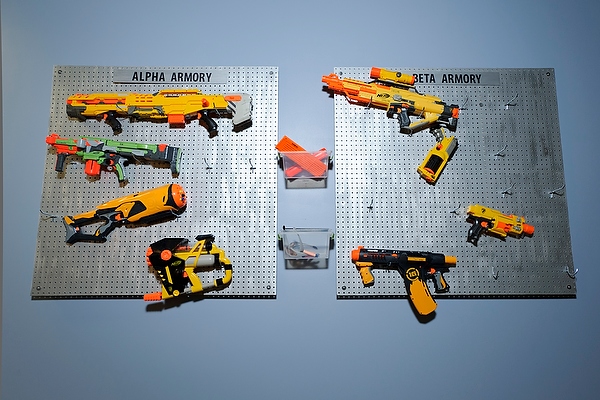
Sitting snug in the lofted second floor of the well-known “Purple Building” on the corner of University Avenue and Randall Street, the Games+Learning+Society is one of Madison, Wisconsin’s most interesting and best-kept secrets. Many use this vividly colored building as a geographic point while giving directions; many others pass it everyday on the way to work and class. But what exactly goes on inside?
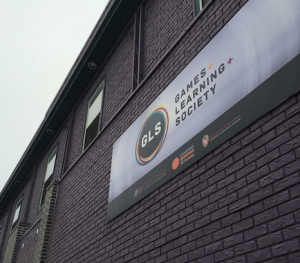
What goes on inside is no less quirky than the building’s outside. Upon entering from the wide cement stairs on the first floor to the second, the ambiance changes instantly. Scattered everywhere among cubicles and computers are Nerf guns, action figures, cartoon drawings and super hero sketches. A giant arcade game is front-and-center in the open workplace. This, it can be concluded, is no ordinary office space.
This is the Games+Learning+Society, or GLS, of Madison, Wisconsin, where market research and analysis are combined with game development to be turned into video games to be used as learning devices. Co-directed by husband and wife Kurt Squire and Constance Steinkuehler, the team that makes up the GLS are professors, game developers, researchers, UW graduate students and interns that work to show how video games can be used for learning.
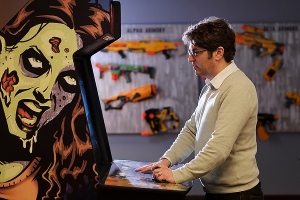
A branch of the Wisconsin Institute of Discovery, the GLS teams up with professors across the nation, local elementary schools and other research institutions and guilds to investigate how games can affect learning. All aspects and team members collaborate at the GLS to develop, research and create games that are used by people of all ages. The GLS creates games that are meant to help the player grow both educationally and sociologically.
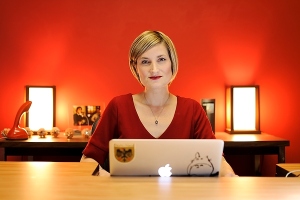
The unconventional games created for learning at the GLS are meant to stir and keep the attention of the player, being especially mindful of when the players are young children. Currently, the GLS is teaming up with a textbook developer to create a virtual textbook for astronomy for elementary school children. Kurt Squire, co-director, breaks down the entire process:
“We are going to do a two-day design activity with them [the astronomy textbook developers]. If it goes well, there will be a contract created and graduate students – with me overseeing – will conduct the primary market research. I will tell my grads, ‘go find me everything that has been written about how children learn astronomy.’ Next, we would create early prototypes of the game based on the research gathered and decide what is necessary for the children to learn about astronomy. We then have to observe the children as they play the game to see if it is helping them learn.”
Just exactly how does one measure how and if a child is learning from a game?
“A whole mix of ways,” Squire says, “With research, development, teaching and service.”
About every week, Squire explained, the GLS has teachers and children coming in for pilot testing and prototyping in a controlled environment for early market research. This can be anything from having the children draw pictures of the types of characters they would want to be in a game to analyzing the children’s’ responses to the games created.
According to Brian Pelletier, creative director, the GLS delves further into learning how players respond to games by measuring the cerebral affects of the games by taking FMRI brain scans before and after playing the games. This type of research occurs when working with the Center for Investigation of Healthy Minds, led by world-renowned neuroscientist Dr. Richard Davidson.
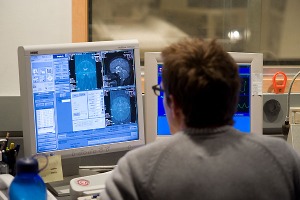
What set aside the Games+Learning+Society apart from other educational game developers are the games the GLS creates that benefit the player sociologically.
Take the GLS-original game “Crystals of Kaydor,” for example. In this game, the player takes on the persona of a robot who crashed on an alien planet and must survive among the flora, fauna and resident aliens. According to Pelletier, this game is far more than that.
“This game promotes pro-social behavior,” Pelletier explained. How so?
“It invites kids to help other people with challenges. It also presents kids with aliens that have human features to their faces – emotion and all. Part of the game is to identify the emotions on the aliens’ faces and understand just why they feel that emotion. This game measures intensities of emotion. It creates awareness to subtleties of emotion that a person can have.”
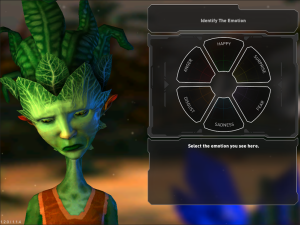
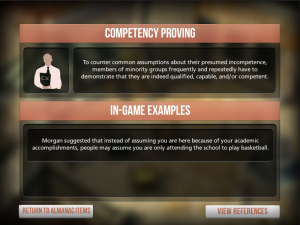
Crystals of Kaydor is a game for middle school-level children. However, the GLS creates games for more than just this age group. The Games+Learning+Society was even part of a team that created a game for CIA agents to understand implicit racial and gender bias.
“I think we can talk about it,” Squire began. “We all carry stereotypes in our mind – it is one of the ways we get through the world. But most times these stereotypes are not helpful and are biased against individuals in treatment. CIA agents pick certain people as likely suspects because they fit a profile, and then miss others that do not meet the profile.”
To counteract and reduce implicit bias the agents have, the team at GLS, along with the University of Oklahoma, created a game that focuses on social interactions and sociological decisions the player must make that work towards decreasing bias.
Spanning from three year olds to adult CIA agents, the GLS makes games for all ages and all types of people. As the work and games increased, the number of staff increased as well. According to Pelletier, the GLS staff nearly tripled in the fall of 2011 when he came onboard. Today, the GLS is a full crew of developers, researchers, professors, designers and UW students making their mark in educational game development.
As more research and analysis is put into games for learning, more questions are asked and game designers face more challenges to prove their games help the player learn the objective. Squire further explained this:
“You’ve got a game-based learning environment where people are making hundreds of thousands of choices. What can you know based on what they did [in the game], what kind of analytics can you look into, and what can you infer based on their choices? And then, how can you both improve learning and what can you say about the future, more generally as a research question? Those are some of the big questions we face.”
Perhaps the most important thing the Games+Learning+Society teaches is that any game is an opportunity to learn. There’s problem solving, critical thinking and decision making in any game out there.
Though there have been some ups and downs, the team at the Games+Learning+Society seems to be doing well in Madison. “Madison has been nothing but pleasant to us,” Squire said. “The overall Madison ecosystem of educational game development is a pretty cool thing.”